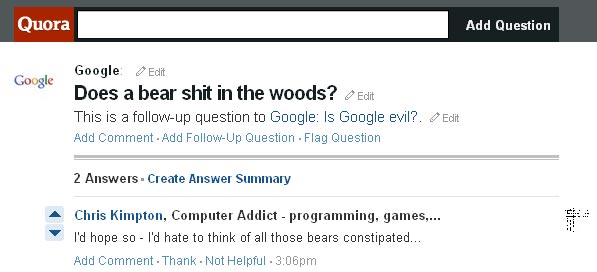You’ve probably noticed that Quora has been getting a lot of press here in early 2011. As a result, the site is getting a lot of new users. As a result of that, there is growing concern that Quora will have a hard time maintaining the level of quality that led to it getting all the press in the first place.
Quora is a kind of Q&A site, and that quality comes from the actual people who have been answering the questions (and sometimes from those asking them). The fear is that too many people will start using it, and either the quality answers will get lost in a sea of lesser-quality answers or that the real experts (in many cases execs of high profile companies) will stop using it.
Some have gone so far as to suggest that Quora could be the next Twitter, simply in terms of being the next big social hit, but aside from the obvious differences between Quora and Twitter in terms of functionality, there are some big differences in how they are run.
Quora is largely based around strict guidelines in order to maintain quality, whereas with Twitter, pretty much everything goes. Twitter has terms of use, but they’re not nearly as restrictive. If I want to tweet, "I had some pancakes today and they were da bomb." or something stupid like that (not that I would), I could do so, and Twitter would be fine with it, because it’s all about freedom of expression and whatnot. On Quora, asking a question like "Who ate the bombest pancakes today?" would likely be heavily frowned upon.
Quora co-founder Charlie Cheever addressed the concerns of potentially diminishing quality at the site today (hat tip to MG Siegler), saying, "We’re deeply committed to making Quora a resource full of high quality content, and so we’re doing a bunch of different things to maintain that. This isn’t an easy problem at all, and the solution isn’t going to be one big change that makes everything perfect; it’s going to take a lot of little things that add up and make a difference."
There’s certainly room for improvement so far, if quality is the name of the game:
"One thing we’re trying to do a better job ASAP on is educating the new users that join the site and getting them up to speed on the policies, guidelines, and conventions as quickly as possible. Yesterday, we added a quick tutorial quiz before a user posts his/her first question."
In the coming months, Cheever said Quora will be "heavily investing engineering effort" in:
– Educating new users about site policies and guidelines
– Improving the feed and voting ranking mechanisms
– Changing the core product to accommodate a Quora with many more users and many more questions and answers and topics
– Building special tools to support the efforts of reviewers and admins to improve the site and maintain civility and generally make it more fun to make Quora better
Again, while Twitter and Quora may be very different products, and serve generally different purposes, perhaps a real solution, beyond guidelines and policies for Quora, would be in APIs, third-party apps, and more freedom (granted, they do have APIs, and I’m sure we’ll see more apps developed as time goes on).
Twitter has long been criticized for excessive noise, but part of the beauty of Twitter is that Twitter doesn’t tell you how you are supposed to use it. In fact, Twitter thrives on how users decide they want to use it. The "retweet" started as a user phenomenon, and grew to be an official feature of the service, for example. Twitter has APIs, which have allowed developers to create apps that users take advantage of to make the service more useful to them – to fit their specific needs for the service.
Quora appears to be taking more of a Wikipedia (review and strict policy) approach, and maybe that’s the right thing (Wikipedia is a very valuable and popular site for information), but Quora is inherently a more social service than Wikipedia, which could make this model difficult in the long run (and as Cheever noted, it already is difficult). Quora has elements of both Twitter and Wikipedia, not to mention Facebook, Digg, Yahoo Answers, and other existing sites. Is Quora trying to be too many things at once? Maybe. Maybe not.
Clearly Quora is onto something, as it has managed to get this far and draw real quality content from users who other people want to follow. This could be one of the most interesting sites to watch over the course of the year. Will it be able to maintain both growth and the integrity that inspired that growth from the get go?
In the end, as discussed in a previous article, it’s really all about the content, so if the interesting content ceases, so will the interest, and likely the growth. Twitter has managed to keep providing interesting content, based on who is tweeting it, even among all the noise. What if tweets on Twitter were edited by the community like Wikipedia? On the flipside, what if Wikipedia had non-stop noise coming in from all angles, like Twitter. We can probably agree that both Twitter and Wikipedia would be less helpful in these cases. The interesting thing is that Quora is somewhat a combination of these two, watching these elements work with or against each other will be something to see.








 WebProNews is an iEntry Publication
WebProNews is an iEntry Publication